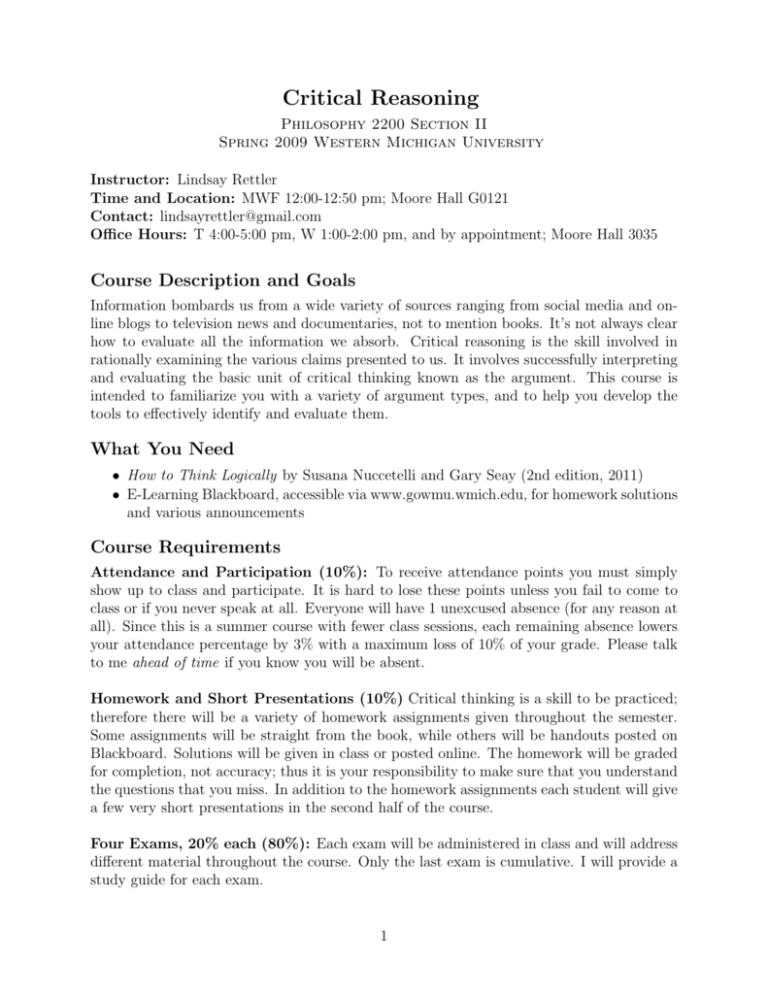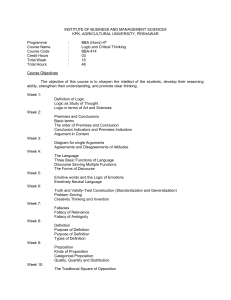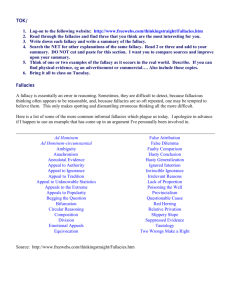syllabus - lindsay rettler
advertisement

Critical Reasoning Philosophy 2200 Section II Spring 2009 Western Michigan University Instructor: Lindsay Rettler Time and Location: MWF 12:00-12:50 pm; Moore Hall G0121 Contact: lindsayrettler@gmail.com Office Hours: T 4:00-5:00 pm, W 1:00-2:00 pm, and by appointment; Moore Hall 3035 Course Description and Goals Information bombards us from a wide variety of sources ranging from social media and online blogs to television news and documentaries, not to mention books. It’s not always clear how to evaluate all the information we absorb. Critical reasoning is the skill involved in rationally examining the various claims presented to us. It involves successfully interpreting and evaluating the basic unit of critical thinking known as the argument. This course is intended to familiarize you with a variety of argument types, and to help you develop the tools to effectively identify and evaluate them. What You Need • How to Think Logically by Susana Nuccetelli and Gary Seay (2nd edition, 2011) • E-Learning Blackboard, accessible via www.gowmu.wmich.edu, for homework solutions and various announcements Course Requirements Attendance and Participation (10%): To receive attendance points you must simply show up to class and participate. It is hard to lose these points unless you fail to come to class or if you never speak at all. Everyone will have 1 unexcused absence (for any reason at all). Since this is a summer course with fewer class sessions, each remaining absence lowers your attendance percentage by 3% with a maximum loss of 10% of your grade. Please talk to me ahead of time if you know you will be absent. Homework and Short Presentations (10%) Critical thinking is a skill to be practiced; therefore there will be a variety of homework assignments given throughout the semester. Some assignments will be straight from the book, while others will be handouts posted on Blackboard. Solutions will be given in class or posted online. The homework will be graded for completion, not accuracy; thus it is your responsibility to make sure that you understand the questions that you miss. In addition to the homework assignments each student will give a few very short presentations in the second half of the course. Four Exams, 20% each (80%): Each exam will be administered in class and will address different material throughout the course. Only the last exam is cumulative. I will provide a study guide for each exam. 1 Phil 2200 Spring 2009, Section II Important Policies Office Hours: I am always available during office hours to discuss any questions about the course or philosophy in general, or anything else of importance to you, including personal issues. You will benefit the most if you come talk to me early on about anything confusing and if you discuss written work at least several days before it’s due. I’m also happy to answer questions via email. If my scheduled office hours dont work for you, then please contact me to schedule a different time. Late Assignments: All homework assignments are due at the beginning of class. Late assignments will be given half credit. I understand that emergencies happen, so come talk to me if you encounter a problem that prevents you from turning things in on time. If, however, you do not bother to make arrangements with me within 24-hours of the due date there is no way to avoid the penalty. Note: you must turn in all assignments to pass the course. Academic Integrity: I will enforce Western Michigan’s policy on academic integrity and report all academic misconduct. You are responsible for making yourself aware of the relevant policies and procedures in the undergraduate catalog: http://catalog.wmich.edu under Academic Policies, Student Rights and Responsibilities. Offenses include cheating, fabrication, forgery, multiple submission, plagiarism, complicity, and computer misuse. Accommodation for Disabilities: Any student with a documented disability who needs to arrange reasonable accommodations must contact Beth Denhartigh at 269-387-2116 or at beth.denhartigh@wmich.edu at the beginning of the semester. A disability determination must be made by this office before any accommodations are provided by the instructor. Course Schedule The following is an outline of topics, readings, and assignments for the course. Please complete the readings and assignments before class on the days for which they are listed. All page numbers are from How to Think Logically 2nd edition, 2011. Homework assignments will be posted on Blackboard. INTRODUCTION TO ARGUMENTS – Week 1 – M 1/5 Introduction W 1/7 No Class – University Holiday F 1/9 No Class – University Holiday – Week 2 – M 1/12 Logical Thinking, Argument Identification and Diagrams: Ch. 1, pp. 1-18 (1.11.4); and pp. 25-27; Ch. 2 pp. 40-44 (2.3-2.4); Ch. 4 pp. 93-107 (4.1-4.5). W 1/14 Practice Identifying Arguments F 1/16 Class Handout – Diagramming Arguments 2 Phil 2200 Spring 2009, Section II Course Schedule, continued... – Week 3 – M 1/19 No Class – Martin Luther King Jr. Day W 1/21 Practice Diagramming Arguments F 1/23 Review for Test #1 – Week 4 – M 1/26 EXAM #1 DEDUCTION AND FORMAL FALLACIES W 1/28 Deductive Reasoning: Ch. 5, pp. 123-141 (5.1); pp. 147-150 (5.2); and p. 160. F 1/30 Types of Deductive Arguments – Week 5 – M 2/2 Identifying Deductive Arguments W 2/4 Formal Fallacies: Ch. 12, pp. 392-398 (12.3). F 2/6 Types of Formal Fallacies – Week 6 – M 2/9 Types of Formal Fallacies W 2/11 Identifying Formal Fallacies in the Media F 2/13 Review for Test #2 – Week 7 – M 2/16 EXAM #2 CATEGORICAL REASONING W 2/18 Categorical Statements: Ch. 13, pp. 420-428 (13.1). F 2/20 Identifying Categorical Statements – Week 8 – M 2/23 Categorical Syllogisms: Ch. 14, pp. 471-478 (14.1); pp. 503-512 (14.4-14.5); pp. 524-525. W 2/25 Types of Categorical Syllogisms F 2/27 No Class – Spirit Day – Week 9 – M 3/2 No Class – Spring Break W 3/4 No Class – Spring Break F 3/5 No Class – Spring Break 3 Phil 2200 Spring 2009, Section II Course Schedule, continued... – Week 10 – M 3/9 More on Categorical Reasoning W 3/11 Review for Test #3 F 3/13 EXAM #3 INDUCTION AND INFORMAL FALLACIES – Week 11– M 3/16 Induction: Ch. 6, pp. 162-177 (6.1-6.2); pp. 181-184 (6.3); pp. 189-192 (6.4); pp. 194-195. W 3/18 Types of Inductive Arguments F 3/20 Identifying Inductive Arguments in the Media – Week 12 – M 3/23 Informal Fallacies: Ch, 7, pp. 199-216 (7.1-7.3); Ch. 9, pp. 269-271 (9.3). W 3/25 Fallacy Presentations F 3/27 Fallacy Presentations – Week 13 – M 3/30 Ch. 8, pp. 226-236 (8.1- 8.2); pp. 242-248 (8.4-8.6). W 4/1 Fallacy Presentations F 4/3 Fallacy Presentations – Week 14 – M 4/6 Ch. 9, pp. 271-279 (9.3-9.5); Ch 10, pp. 299-314 (10.1-10.7); pp. 319-320 (10.8). W 4/8 Fallacy Presentations F 4/10 Fallacy Presentations REVIEW – Week 15 – M 4/13 Review for the Final Exam W 4/15 Review F 4/17 Review M 4/20 FINAL CUMULATIVE EXAM at 10:15 am - 12:15 pm 4





